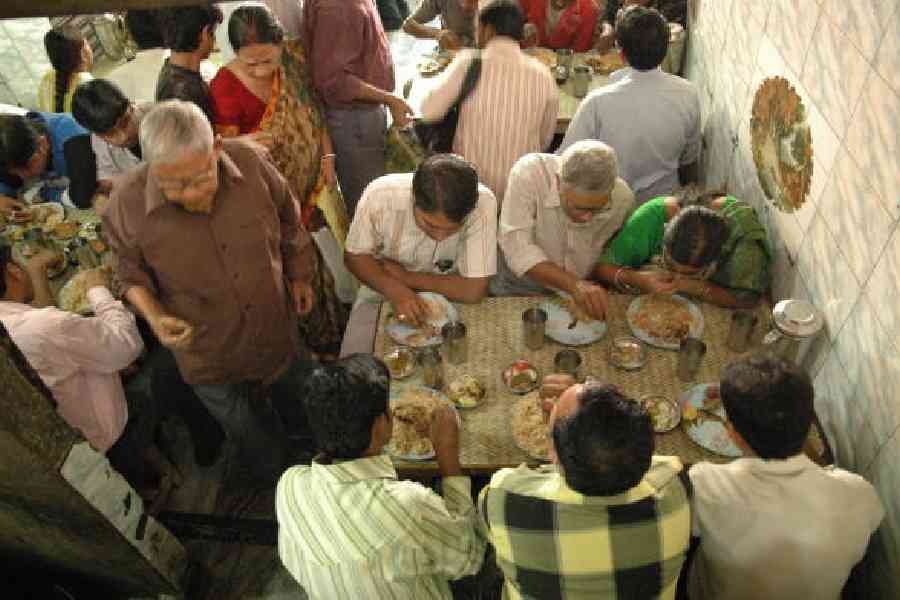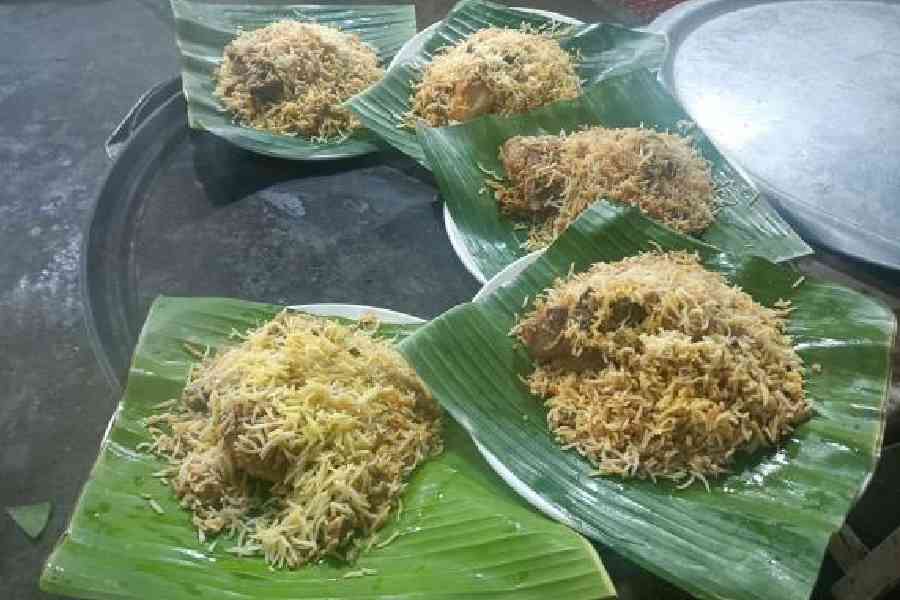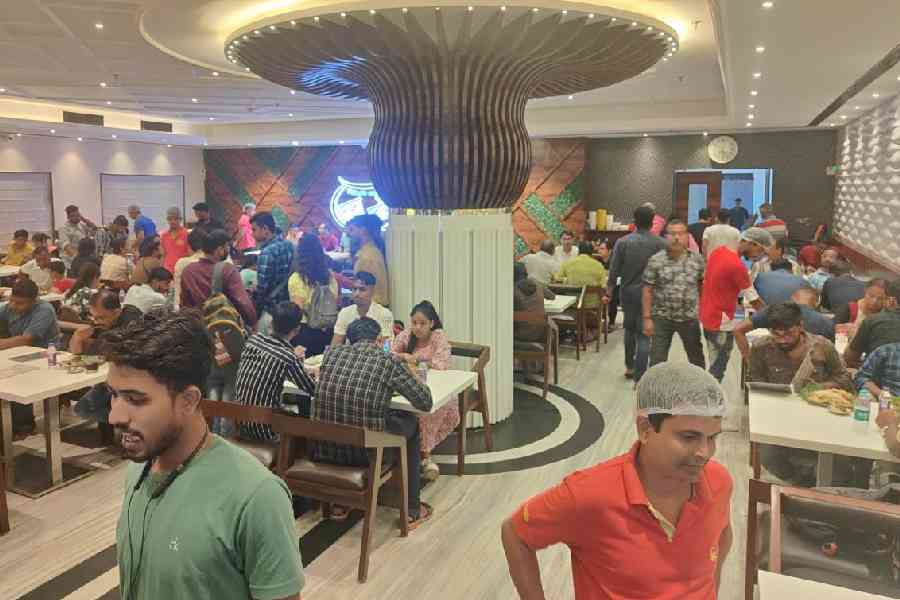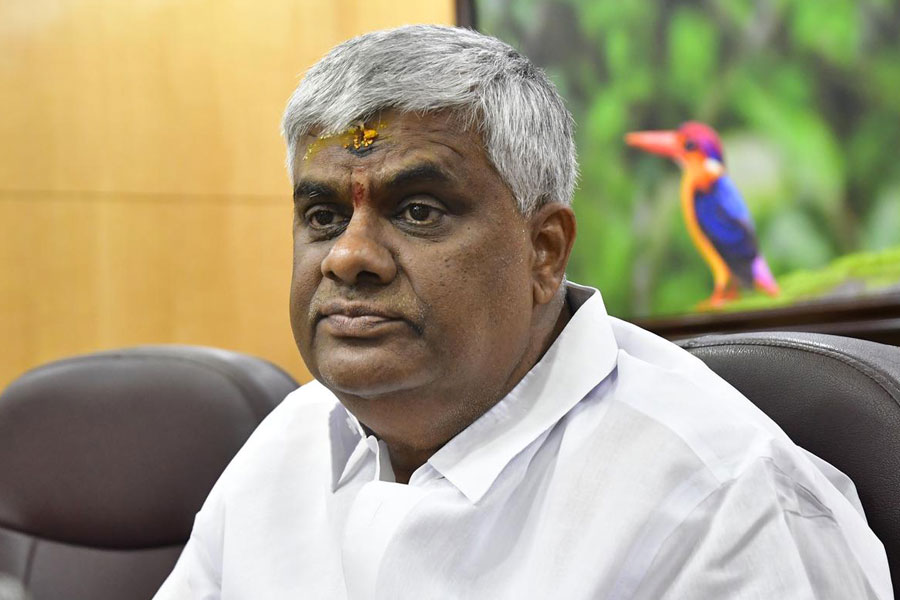The roundabout near the Barrackpore Railway Station in North 24-Parganas is swirling with traffic — buses, totos, autos, four-wheelers. The footpath is crowded, but this is nothing in comparison to the number of people standing in queue in front of the restaurant close by. At any point in time, there are 25 people lined up outside Dada Boudi Hotel. “On Sundays, the queue goes right up to the station, which is about 50 metres away. It becomes difficult to drive,” says a toto driver.
This is the older of the two outlets the restaurant has in Barrackpore. A 2017 report in The Telegraph described it thus — “a matchbox of an eatery close to the Barrackpore station”.
“It is soon going to be a seven- storey building,” says the toto driver pointing to the construction work underway.
The open area in front of the restaurant is full of 20-somethings. “We have gathered here for our reunion,” says Rupali, a student of Calcutta Police Law Institute. She lives in a mess-bari in Sealdah, which is a 40-minute journey away by train. “I have never had a chance to eat here,” she says.
Dada-Boudir biryani is the name of a phenomenon. “If you are a foodie and a biryani lover, this is a must-visit,” says Rupali and adds, “My friends travel for hours to come here. For them, it is a ritual.”

a file photo of the old space
Not many people know that the restaurant was never designed to sell biryani in the first place. “My grandfather Ramprasad Shaw started it in the 1940s,” says Sanjib Saha, who is the current owner. Ramprasad had come from Bihar’s West Champaran district and joined the British police. After a few years, he quit the job and opened Janata Hindu Hotel.
Being close to the railway station, there was always a steady flow of passengers. The eatery selling rice, dal, vegetable curry, fish or eggs at 25 to 75 paisa per plate did brisk business. The customers were mostly labourers employed by the railways. The clientele also included rickshaw pullers, drivers, coolies, recalls Sanjib. “A lot of them, like my grandfather, were Biharis,” he adds.
But this slowly changed in the 1960s. “From the time my parents started running the hotel, Bengalis started coming here; bank and government officials too. They would address my parents as dada-boudi,” says Sanjib. His mother, who is a Bengali, had taken charge of the kitchen by then. It is she, according to Sanjib, who turned the small business into a thriving one. In time, Janata Hindu Hotel became Dada Boudi Hotel and the Shaws took on the matriarch’s maiden name and became Sahas.
In the early 1980s, Sanjib and his friend Kamil Khan decided to start selling biryani. Sanjib says, “There were hardly any biryani shops here those days. After much thought, we included in our menu a plate of chicken biryani. We priced it at Rs 11 per plate.” And that’s how it remained for a decade, invisible, barely discovered, just another item on the menu.
Fast forward 30 years and the stretch near the train station has three other biryani shops, well-known brands with greater urban connect. But Dada Boudi Hotel has not only not lost ground to these, its popularity has swelled.
It is 5.30 in the evening. In an open space, close to the main entrance, some men in uniform are opening handis, ladling out biryani, ensuring every plate has the same number of meat chunks, the same amount of rice. Their practised movements, the way their eyes dart, their hands move in synchronicity, it is quite a performance.
From lunchtime on, the queue forms, assumes a certain length and remains that way till 4pm. In the queue are students, office-goers, locals; be it dine-in or takeaway, one has to queue up. The waiting whets the appetite, the queuing up seems to add to the mystery pull of the dish.
Sanjib is at the cash counter. Asif Ahmed is waiting to pay for his meal. He says, “I came for work. I live in Bongaon. Every time I come to Barrackpore, I make it a point to eat mutton biryani here before boarding the train.”
Raseshwari Datta is also waiting; she works for the police department in Barrackpore as an examiner and lives in Dum Dum. She says, “Today, I came here to conduct test-drive sessions for people applying for driving licences. At other times, I come here to order police uniforms. Every time I come, I make it a point to pack biryani from this restaurant. No one makes the kind of biryani that they do. It stands out for its taste.”
Nilesh Mukherjee is not here on work; he has come specifically all the way from Tollygunge. “It is my daughter’s birthday. We wanted to eat out. This place is far away but the quality of the biryani makes up for the trouble.” Rajesh Biswas has come from Ranaghat, which is 60 kilometres by road but takes a little over an hour by train. “It is nostalgia. My parents used to come here earlier,” he says. Nearly everyone talks about the generous cuts of meat in the rice.

its famed biryani
M. Kanjilal is in his seventies and a resident of Garia in south Calcutta. He tells The Telegraph, “I come to visit my daughter every month. Her in-laws live here. But I do not eat at their place; one is not supposed to have even a drop of water at a daughter’s marital home.” Then he adds with a chuckle, “It is as good an excuse as any to eat here every month.”










